On the Mongolian border. Xi Xia Empire
In the previous article, we focused on the events associated with the death of the Khitan Liao nomadic empire, defeated by the Jurchen Tungus tribal union, which created the Jin empire.
But the second non-Chinese empire that existed during the Mongol invasion was the empire of the Tangut tribe - Xi Xia.
Who are the Tanguts?
The ancestors of the Tanguts, the Qiang tribes, lived in western China, on the border with Tibet. Their early state of Tuyuyhun (285–663) was defeated by their kin Tibetans, and they moved north to Ordos territory. The self-name of this ethnos is Minya, in the European tradition adopted from the Mongols, they are called Tanguts.
The Tanguts lived in a tribal society, some of them lived on Chinese territory, and their leaders were Chinese employees. From the X century. because of the weakness of the Chinese states, the Tanguts acquire independence. With the emergence of the Songs, the Tanguts initially obeyed the empire, but changes in the tribal society, the transition to a territorial community led to the creation of an independent and independent potestary structure of the Tanguts.
At the head of this movement was Ji-Qiang, the first sovereign of Xi Xia or Da Xia. Legend has it that he had his teeth cut through before he was born. He did a lot of military exercises, hunted a lot, was the best shooter among the Tanguts, once, having met a tiger, he killed him with the first arrow. Ji-Qiang began a war with the powerful and newly formed Song empire in 982. Nevertheless, as it turned out, the opponents turned out to be equal in strength: the Song troops did not seek to invade the desert areas of the Tanguts, and they did not try to penetrate into Chinese territory.
Ji-Qiang formed a management system for the leadership of the army and the Tangut tribes. But the Tanguts could not stand alone against the Song empire, so they accepted patronage from the Liao empire. So from the rebellious border foreman of the Song empire, he became the ruler of the new state, in 990 he received a letter with the title of Wang (head) of the Xia state from Liao.
Ji-Qiang was forced to constantly maneuver: he either accepted positions from the Songs, then besieged their cities and raided, evading battles with the Song expeditionary forces. After the capture of the city of Lizhou (present-day Guangxi-Zhuang Autonomous Region, PRC), the Tanguts blocked western trade to the Chinese. The Chinese prevented the Tanguts from trading in salt, a key product of their export. The horses were the second.
After lengthy clashes, Song decided to transfer the five western districts, inhabited by Tanguts and Chinese, to Ji-Qiang - this is how the state core of Xi Xia was formed.
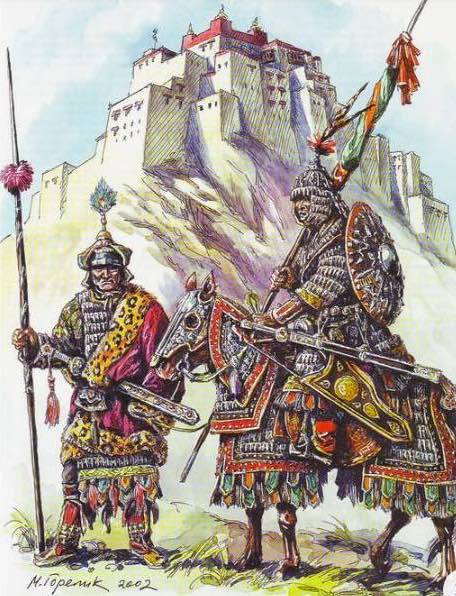
Ancient Tibetan warriors. Reconstruction by M. Gorelik
From the north, the Tatars became their neighbors, from the north-west and west - the Uighurs and Tibetans. The Uyghur lands of Ganzhou, Suzhou, Guangzhou and Shazhou were captured by the Tanguts in 1035, and they also conquered a part of the Tibetans, who actively resisted them both in the west and in the east. From the south-east they bordered on the Song empire, from the east - with Liao, and after 1125 - with the Jurchen empire of Jin.
Tangut state
Most of the Tanguts were cattle breeders, wagons, and some were farmers:
The basis of society was a large family - a wagon, families were united in clans and tribes. This structure was at the heart of the Xia state.
The Tanguts considered trade to be the light beginning of the world, along with agriculture and cattle breeding, and actively developed it.
A peaceful relationship with Song enabled Xia to develop for 40 years.
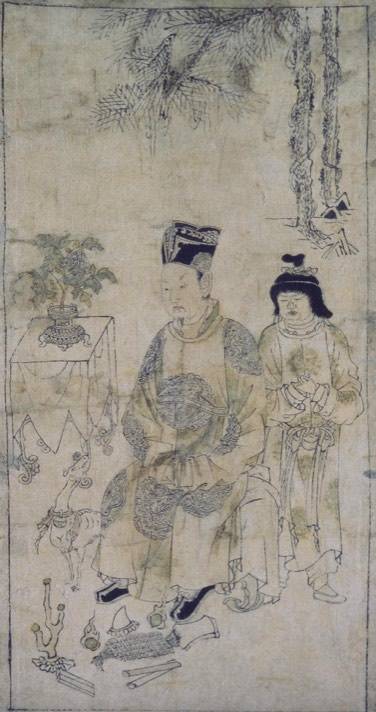
Emperor Xi Xia and a boy. Paper. Hara Horo. PRC. GE. Russia
Since 1032, the new Burkhan ruler Yuanhao or Yuan-hao has been carrying out a series of reforms. A comparative analysis shows that these reforms correspond to the period of the territorial community, when institutions of power and self-identification are created within the framework of pre-state forms of government.
For the country, it was not Chinese that was chosen, but its own motto: Hsien-Tao - "A clear path". A unified hairstyle for men was introduced, tuff, when most of the hair was shaved off, only bangs and braids remained on the temples, while the emperor cut his hair first, and then gave three days for a general haircut, after which all uncut were killed, this also applied to long-haired tanguts, and Chinese and Uyghurs.
The capital was renamed to be the New Tide of Happiness. The Tangut writing system was created, since the Tangut language was tonal, “national” and Chinese schools were created, including schools of Tangut music.
The largest library of Tangut manuscripts is kept today in our country, in St. Petersburg.
A uniform dress was introduced for officials, and the military reform divided the country into 12 military-police districts. The institutes of management were shaped according to the Chinese model. Subsequently, Emperor Liang-tso will introduce completely Chinese state etiquette, will receive historical and philosophical literature from the Song.
Period from the middle of the XII century. became the heyday for the Tangut state. Legislation is being codified, Confucianism is developing. Foreign ambassadors report the successes of Xi Xia despite the Khitan uprising in Xia:
Unlike Burma and Tibet, the other two states of the Tibetan-Burmese peoples, various power groups of Xi Xia saw not only their "own" path, but also used the Chinese path of state development.
Difficult climatic conditions - most of the territory fell on deserts - made its economy, and the country as a whole, extremely vulnerable.
In 1038 Burkhan Yuanhao declared himself emperor, so three “sons of Heaven” appeared in the Far East. Instead of traditional gifts to the Song court, he sent a boastful letter in which he said that Tufan (Tibetans), Tata (Tatars), Zhangye and Jiaohe (Uighurs) were subordinate to him.
Tanguts wars
Emperor Ren-tsung (1010–1061) could not bear such an insult, the Chinese called it the "Yuanhao rebellion", both sides began to prepare for war, and Yuanhao had been conducting reconnaissance in the rear of Song for a long time.
The Chinese plan meant to strike with the forces of 200 thousand troops, which, in their opinion, was three times more than that of the Tanguts, and to capture some of the elders of the Tangut tribes who would go over to the side of the Song. The author of this plan, Liu Ping, will soon be captured by the Tanguts. The first year of the war was in the struggle for the border fortresses and did not bring any success to either side.
In March 1041, the Tanguts moved to the Song territory, the Wei River valley, the right tributary of the Yellow River. They were pursued by the Song army, here the first column of "General" San Yi discovered the silvered boxes, and soon the column of General Ren Fu approached. The troops crowded, and when the boxes were opened, domestic pigeons with whistles tied flew out of them. Immediately, the Tanguts cavalry struck at the crowded troops, the battle lasted from morning to noon, and when it seemed that luck was on the side of the Chinese, an ambush regiment entered the battle and put the Song army to flight.
At this time, the second Song army was defeated in the siege of the Tanguts fortifications, the losses of the Song amounted to about 300 thousand people (?).
But Song fielded new troops, peace negotiations did not lead to anything, and Yuanhao agreed with the Liao empire that as soon as the ice covered the Yellow River, they would oppose Song together. The troops managed to hold the lands west of the Yellow River.
At the same time, the constant droughts that were in Xia, bled the Tanguts, and in 1042 negotiations began, but everything came down to the recognition of the Tangut emperor.
But Song was not easy either, the Khidans demanded that they cede 10 Chinese districts, in return for Liao they received an increase in tribute. And the Tanguts invaded the Weizhou province, this is where the active hostilities end. Song gathered another army of 200 thousand soldiers, it was not capable of functioning, and the Tanguts, despite their lesser capabilities, managed to concentrate significant forces in the most important areas.
But the war undermined both Xi Xia and Song's economies.
The emperor of the Song dynasty recognized the title of "sovereign" for the Tangut kagan, paying him tribute in silk, silver and tea.
As soon as the war with the Song ended, the war with the Iron Empire immediately began. The reason for the constant clashes between them was the tribes related to the Tanguts who lived in Liao. Having crossed the Yellow River, Liao's troops advanced in three columns against Xi Xia. The central column was led by Emperor Liao. The weakened Xia tried to resolve the issue peacefully, but the hardliners agitated Emperor Liao to destroy the Tanguts. The Khitan set up camp at the Shanse Monastery. While the Tanguts were destroying everything around, the Khidans were starving, there was no food for their horses. Soon the battle began, the Khitan defeated and surrounded the Tangut cavalry, which with incredible efforts got out of the encirclement. All forces entered the battle, and at that time a strong dusty wind rose right in the face of the Khitan people, and they trembled. The huge army fled, the Tanguts struck at the camp of Emperor Liao, whose guards wavered. Taking him prisoner was not difficult, but Yuanhao wanted peace, which he signed with Liao. But the tribal Khitan's noses were cut off and sent home.
New war 1049-1053 ended in nothing, although Xi Xia paid Liao a huge tribute in cattle.
The constant clashes between Xia and Song continued, which sought to prevent the strengthening of either Liao or Xia.
In the 60s. Due to ceremonial differences at Emperor Song's coronation, Xia began fighting against Song. The army was led by the emperor Liang-tso himself, who was wounded during the siege. He was wearing a felt hat, armor, on top of which was also wearing a silver armor. He died of a wound at the age of 21.
Raids and border skirmishes did not stop throughout the 70s.
In 1081, a new war of Song against Xi Xia began, the first allies were the Tibetans, in the amount of 100 thousand tribal militia (?). In the invasion of Xi Xia territory, 300 thousand soldiers were involved, the Tanguts used the scorched earth tactics, which led to the death of a huge army.
The Xia wars showed how weak the Song army was. The theoretical treatises on the Song army were, of course, wishful thinking. And Song spent 80% of government spending on the army. Song's victories were achieved by the fact that the country had a huge economic resource and the ability to use a huge number of people who were involved in the army and did not have combat training. Often times, wars were inspired by the "generals" of the Song, who had huge benefits from the campaigns.
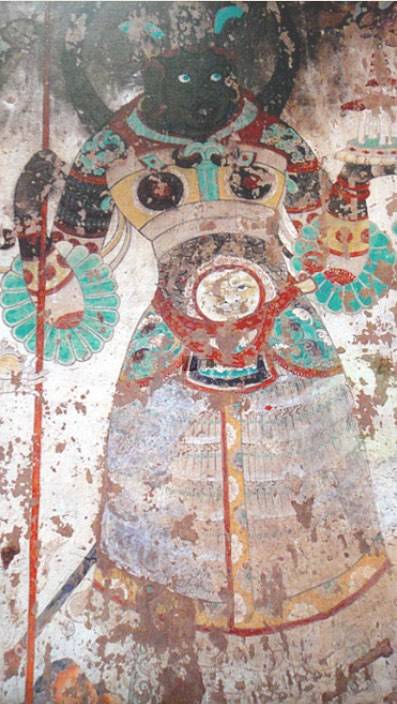
Warrior. Xi Xia. Yulinku cave. PRC
At the beginning of the XII century. Jurchens destroyed the Khitan Liao empire and inflicted a serious defeat on Song, the latter even ceased to border on Xia. But Xi Xia developed friendly relations with the new conquerors and founders of the new empire, since their lands, in comparison with the rich lands beyond the Yellow River, were of little interest to the Jurchens. Nevertheless, it was a dangerous neighbor, whose commanders had long thought about joining Xi Xia. Since the 30s, Xia has been active on the borders with Jin and annexes the East Tibetan tribes. At the end of the XII century. friendly relations were established between Jin and Xia, but at the beginning of the XNUMXth century, on the very eve of the Mongol invasion, the states parted.
Army
During the reign of Zhen-guan (1101-1113), a code of military laws "Jasper Mirror of the Administration of the Zhen-Guan Years" was created. It has come down to us in a truncated form and is stored in our country, in St. Petersburg. The army consisted of regular units and auxiliary troops. The maximum number of troops, according to Chinese sources, is 500 thousand soldiers. All men who had reached the age of 15 were considered liable for military service, but not all of them went to war, but every second.
The warrior was supposed to have a bow and armor. For the service, according to some sources, a qualification was established: depending on the number of cattle, the Tanguts went to serve either with a horse and with equipment, or only with equipment, without a horse, or in "engineering" units. According to other sources, the state supplied the soldiers with horses and camels.
At first, the Tangut bows were inferior in quality to the Chinese ones, the bowstring was leather, the arrows were made of willow, but gradually they mastered the production of high-quality bows, which were highly valued in the Song. Thus, the "bow of the miraculous hand" was presented to the imperial palace, and the Mongols took the craftsmen to Karakorum. The latter also brought gunsmiths from other Chinese states.
The swords that made the Tanguts, with the hilt of a dragon-bird, were popular in China, but their armor did not differ in durability, and the absence of iron played a role, both in Xia and Liao.
A detachment of 100 warriors was the main organizational unit of the Tanguts. The main link of junior commanders consisted of "leaders" or "guides". There was a system of "military inspectors", the same as in the civil office. In the army, there was a table of ranks, special attention was paid to the system of incentives and awards, for example, “when the commander personally killed the enemy in battle" or "when the commander killed the enemy and his squad was defeated","behind the gap, gaps in the wall" or "for good knowledge of the area"Is relevant, isn't it? Rewards were paid for trophies and were directly proportional to the capture of livestock, drums, armor, or horses. The officers wore paysa as an insignia.
Punishments were strictly differentiated, for example, for the death of a commander, the officers next to him were punished, and the soldiers' relatives were also punished, they became slaves of the state.
Fighting was not undertaken without certain ceremonies. The Tanguts used four types of divination before the battle. The army set out on a campaign only on an odd day.
Alongside the "regular" army were groups of brave men or volunteers. Although the Chinese legislation indirectly influenced the military laws of Xia, nevertheless, it was of a national character, and the milder punishments listed in it indicate that these were laws of a transitional period: from the tribal to the neighboring community, the Tangut have this the system was called "gwon".
Tibetan tribes have always been famous for horse breeding, the Tanguts themselves supplied horses to China. For the army, horses were bred at state stud farms and purchased from private breeders. Therefore, their cavalry, the main striking force of the army, had high-quality horses. No wonder the Chinese wrote about the great distances that the Tanguts cavalry covered "like a lightning strike or a cloud flying».
The shock units of the cavalry, originally from Pingxia, were called "iron hawks».
The infantry was used during sieges and in the mountains, especially the infantrymen-mountaineers, "bubazi", were famous.
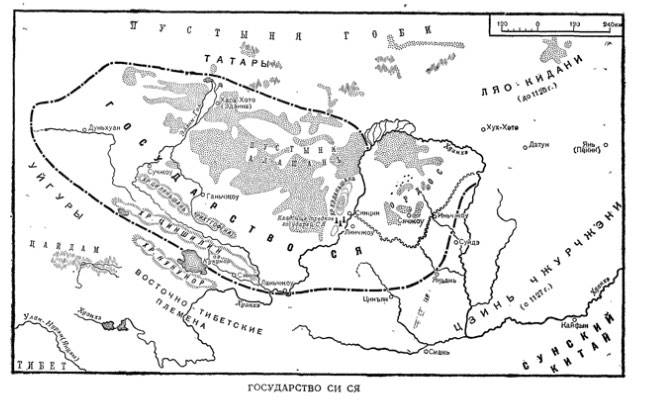
Xi Xia Empire Map
The battle began with riders tied to horses, so, even if they were killed, they advanced in a general formation. After that, the infantry entered the battle, again covered from the flanks by the cavalry. The commanders were on the hills in the rear, surveyed the entire battlefield and led the battle, the cavalry and infantry commanders were also in the rear.
But in the siege and defense of cities, the Tanguts were not masters, which contributed to their defeat by the Mongols.
Fleeing from the battlefield among the Tanguts was not considered shameful, and we are not talking about a feigned escape, but it was necessary to return to the battlefield and conduct a certain rite of revenge, kill a horse, a rider, or at least a stuffed warrior from a bow.
Their perseverance in battles is also associated with this rite, when after each flight the army gathered again and began a new battle. So, after several defeats from the Uighurs, with their tenacity they ensured victory in the war.
The Tanguts treated the prisoners cruelly, eating the hearts of the bravest warriors. Taking Xuanwei in 1105, they executed the Chinese commander by eating his heart and liver.
Before the war of 1040, twelve clan elders drank wine mixed with blood from cups made of skulls.
In the XII century. 12 military districts were created, there was a separate palace guard, consisting of 70 thousand soldiers.
It will be fair to note that the figures indicated often in the sources are not accurate and raise legitimate questions. So, initially the palace guards were in the number of 5 thousand best shooters - it is not clear how it increased to 70 thousand?
In general, the Tangut military system, although it was influenced by China, bore the features of national specificity.
Due to the foreign policy situation that developed in the late XNUMXth - early XNUMXth centuries, Xia did not conduct active hostilities, there were no threats from the Jin, and they were insignificant from the steppe, the Uighurs and Tibetans were conquered, and there were no borders with the Song. ... Therefore, its armed forces were significantly weakened, while a powerful military alliance of the Mongols was forming in the north.
Sources and literature:
Secret legend. Mongolian Chronicle of 1240 titled Mongol-un niruca tobciyan, Moscow, 1941.
Book of Marco Polo // Giovanni del plano Carpini History of the Mongols. Guillaume de Rubruck A Journey to Eastern Countries, Book of Marco Polo. Entry. Article, comments by M. B. Gornung. Publishing house "Mysl". Moscow, 1997.
Kychanov E.I. Essays on the history of the Tangut state. M., 1968.
Kychanov E.I. History of the Tangut State (Historical Research) SPb., 2008.
Kychanov E.I. Tangut Foundation of the Institute of Oriental Manuscripts of the Russian Academy of Sciences and its study // Russian expeditions to Central Asia in the late 2008th - early XNUMXth centuries. SPb., XNUMX.
Samosyuk K.F. Buddhist painting from Khara-Khoto XII-XIV centuries. Between China and Tibet. P.K.Kozlov collection. SPb., 2006.
To be continued ...
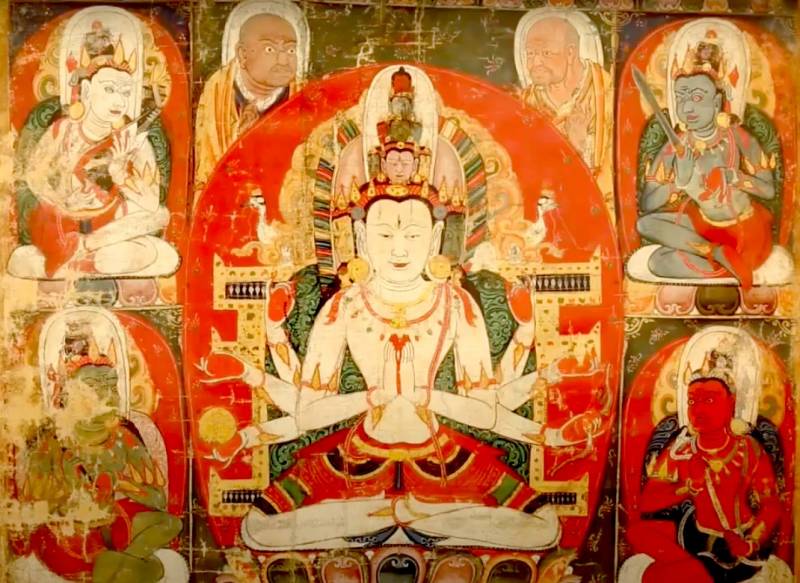
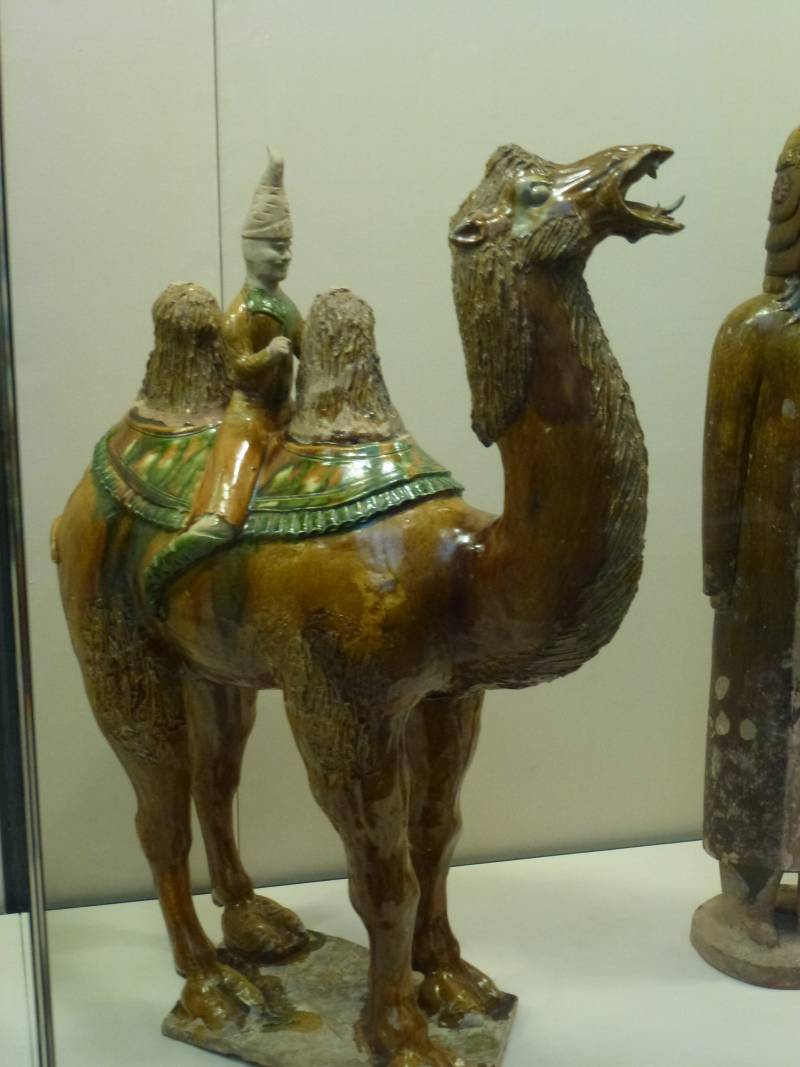
Information